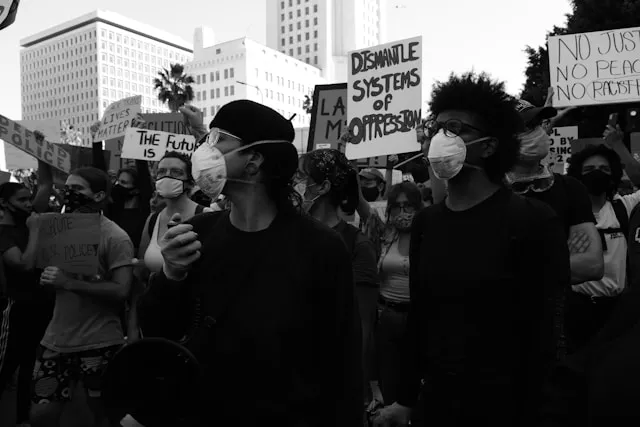I wrote the original version of this essay in response to an article assigned in the writing & resistance course I took in May. I’ve updated it some. I’m not sure it captures exactly what I’m trying to say.
The opening paragraphs of “Resist, Refuse” by Teju Cole in The New York Times Magazine, 9/8/18:
“The courage of the French Resistance, a courage immeasurably beyond chatter and imposture, helped make ‘resistance’ a holy word in our common tongue. We look back on these people – many of whom were caught, most of whom were tortured and executed soon after they were caught – with frightened admiration. Facing the unspeakable, they committed themselves to the unimaginable.
But ‘resistance’ is back in vogue, and it describes something rather different now. The holy word has become unexceptional. Faced with a vulgar, manic and cruel regime, birds of many different feathers are eager to proclaim themselves members of the Resistance. It is the most popular game in town.”
This article goes on to compare the French Resistance with the upswell of outrage and horror we felt in early 2017 and to encourage people to refuse to acknowledge that as resistance. Since the election, I’ve read other progressive essayists say similar things.
During Trump’s first presidency, my Twitter followers grew from 50 to 5,000 because of “the resistance.” As someone with an ancient background in activism, I was fascinated watching it. People I didn’t know kept sharing my name as a fellow resister to follow. It was weird and allows me to understand what Cole is saying.
But I don’t entirely agree.
I believe all things exist on a continuum – there are degrees and flavors of everything. Through that lens, I’m not angry – Cole sounds cynical and angry – that people use the word resistance when they see threats on the horizon.
Resistance is an urge. It goes like:
-Recognizing threat or injustice
-Feeling pressure in the chest
-Looking for what resistance already exists
-Deciding what, if anything, I can and am willing to do.
My activism*, when I was younger and less focused on work for survival, was for No Nukes, nuclear disarmament, and helping unhoused people. The latter is the only area where we succeeded in making real change, largely through civil disobedience campaigns. But there were defeats along the way, moments of despair. A key lesson I learned is the antidote to despair is resistance. I’d feel the pain, despair, anger, seeming hopelessness of what we were dealing with. Then I’d get the pressure in my chest that was the urge to push back, to say NO – the word of resistance. Then I’d do something about it. And I’d keep coming back to do more.
I think that urge is what lay behind the movement Cole hates, people standing up on social media to identify themselves as resisters. We watched in horror as Trump became president, then five days later Greenpeace hung this glorious banner outside the White House, and the word uplifted us all.

It said NO.
It said DO SOMETHING.
It said KEEP DOING SOMETHING.
Two days after that Trump signed the Muslim ban, and we saw the general horror of him become specific and concrete. People flocked to airports that weekend to witness and call out evil, and the ACLU got $24 million in donations over those couple of days. Collectively people of good heart resisted how they could.
Threat existing on a continuum – that point where, between here and the horizon, danger stands – means the need for resistance is more immediate and urgent for some than for others. Privilege plays a huge part in where that threat stands. Maybe it plays the only part.
If there’s a continuum of resistance, the French Resistance is at/near the far end. At the beginning are the people starting to think of themselves as capable of resistance, wanting to be in a community of resisters. These folks understand something needs to be done. They may not know what and may well be scared. There’s a continuum of people in that group of self-identified resisters, so there’s a continuum of experience in understanding and participating in resistance actions.
Just because a thing isn’t at the pinnacle of what it can be, that doesn’t mean it shouldn’t exist. Nascent resisters aren’t denigrating the bravery and sacrifice of the French Resistance (nor of more recent efforts). The threat of fascism is here, now, in the US and elsewhere. Genocide is here, now, in Gaza and elsewhere. I can’t mock people who are re-shaping their identities to include the desire to resist it.
I don’t want to take that word away from them because I don’t want to take the impulse away from them.
But at the same time, we all must move beyond an impulse. We must figure out what to do. I don’t know. I’m 70 and don’t have much energy. I’m too comfortable hanging out with my little dog and escaping with TV. I haven’t done anything in years, beyond the Women’s March (sans hat), donating to the ACLU, and some pre-election work. I don’t feel like doing anything hard. But things are horrendous now in Gaza and elsewhere, on so many fronts in this country. And they’re about to get so much worse.
I have to take a hard look at who I am and what I am willing to stand for.
When Antifa was in the streets of Portland saying No and Fuck Off to Nazis et al, I wanted so badly to hop the Max and join them. I felt that pressure in the chest. But being older and too comfortable and scared I’d get my ass kicked in the first five minutes, I didn’t do anything but cheer them on. I’m not a brave person.
At my stage of life – at your stage of life – what does personal resistance look like, and when do we make it happen? What is strong enough action to make a difference? (I don’t think it’s only marches.)
Where does courage come from?
* details here in these blog posts


